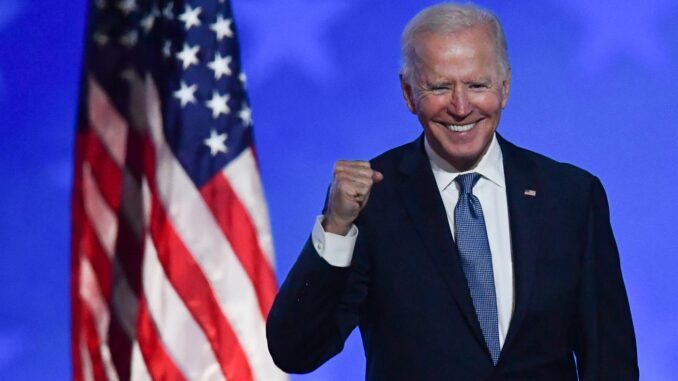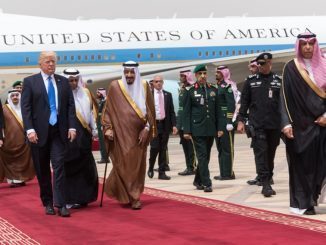
Leaders of the UAE, Bahrain, Oman, Kuwait, Qatar, Yemen, Palestine, Sudan, Egypt, Lebanon, Jordan, Iraq and Libya congratulated Biden, while Saudi Arabia and Syria have not yet released statements.
Leaders of the Arab world congratulated US presidential election winner Joseph Biden and Vice President-elect Kamala Harris over the weekend, after the presidential race was officially called by major media outlets.
Many of the leaders – particularly in the Gulf – have had good relations with President Donald Trump, who has taken a tough stance against Iran through his ‘maximum pressure’ policy. Despite this, they all congratulated Biden for the victory over Trump, excluding the leaders of Saudi Arabia.
Below are the statements from Arab leaders that were reported by official news agencies and posted on social media:
United Arab Emirates
Abu Dhabi Crown Prince and Deputy Supreme Commander of the UAE Armed Forces, Mohammed Bin Zayed, wrote on Twitter:
“Congratulations to @JoeBiden and @KamalaHarris on winning the US elections. Our sincere wishes for further development and prosperity for the American people. The UAE and USA are friends and allies with a strong historic partnership that we look forward to strengthening together.”
Vice President Sheikh Mohammed bin Rashid al-Maktoum, also premier and ruler of Dubai, took to Twitter to express congratulatory remarks.
“Congratulations to the President-Elect of the United States Joe Biden and Vice President-Elect Kamala Harris. We look forward to strengthening our five-decade enduring and strategic relations,” the UAE VP wrote.
Bahrain
Bahrain took a more old-school approach, sending a congratulatory cable to President-elect Biden and Vice President-elect Harris.
The state-run Bahrain News Agency said Prince Salman bin Hamad Al Khalifa, the Crown Prince, Deputy Supreme Commander and the First Deputy Prime Minister of Bahrain, sent a congratulatory cable highlighting “the longstanding and historic partnership” between the two countries.
Oman
Oman’s sultan Haitham bin Tariq al-Said wrote a letter expressing his “sincere congratulations” to Biden for “gaining the confidence of the American people”.
The Sultan also wished the President-elect “success in leading the friendly American people towards further progress and welfare,” the gulf country’s state-run state news agency reported.
Kuwait
Kuwait’s Emir Sheikh Nawaf Al Ahmed Al Sabah, congratulated both Biden and Harris – set to become the first woman, first black person and first person of Indian descent to be elected to the position – on the win in a cable sent out on Saturday, the state-run KUNA news agency reported.
In the cable, Sheikh Nawaf praised the “historic and strong relationship” between countries.
Qatar
Qatar’s Emir Sheikh Tamim bin Hamad Al Thani took to Twitter to congratulate Biden and Harris and expressed willingness for continued cooperation between the two countries.”Congratulations to President-Elect @JoeBiden and Vice President-Elect @KamalaHarris. My best wishes to the people of the United States and I look forward to working together to continue strengthening the friendship between our countries,” he said in a tweet.
Yemen
The President of Yemen’s internationally recognised government, Abdrabbuh Mansour Hadi, sent a telegram congratulating Biden for the win and expressing willingness to strenghten bilateral ties, a presidential statement said.
Hadi wished Biden “good health and happiness” and hoped the government and people of the US would have “progress and prosperity” under the new administration.
Palestine
Palestinian President Mahmoud Abbas congratulated Biden, hinting at renewed relations with the White House.
“I congratulate President-elect Joe Biden on his victory as President of the United States of America for the coming period,” Abbas said in a statement issued on Sunday from his West Bank office.
Abbas boycotted dealings with President Donald Trump’s administration after Trump recognised Jerusalem as the capital of the Jewish state in 2017.
“I look forward to working with the President-elect and his administration to strengthen the Palestinian-American relations and to achieve freedom, independence, justice and dignity for our people,” Abbas said in the statement.
Sudan
Sudan’s premier Abdalla Hamdok on Sunday congratulated Biden and Harris “on behalf of the Sudanese people”.
In a tweet, Hamdok said he is looking forward to working closely with them both to continue building bridges of friendship and cooperation”.
Egypt
Despite recent warnings that US-Egyptian relations would sour under Biden, Egypt’s Abdel Fattah al-Sisi congratulated the democrat president-elect on Saturday according to a statement released by presidential spokesman Bassam Radi.
“The President looks forward to joint cooperation and work to enhance strategic relations between Egypt and the United States, in the interest of the two friendly countries and peoples,” the statement said.
Last month, a letter signed by democrat US lawmakers signaled that Sisi’s rights violation ‘will not be tolerated’ if Biden won the presidency, warning of a tougher foreign policy stance against the north African country.
Lebanon
Lebanese President Michel Aoun – whose son-in-law and former Foreign Minister Gebran Bassil recently got sanctioned by the Trump administration – wrote to Biden congratulating him for winning the presidential election.
Aoun also expressed “hope” that Biden’s term will “restore balance in Lebanese-American relations”, according to a tweet by the Lebanese Presidency.
Jordan
Jordan’s King Abdullah II on Saturday tweeted a photo of him with Biden, congratulating him on winning the electoral race.
“I look forward to working with you on further advancing the solid historic partnership between Jordan and the United States, in the interest of our shared objectives of peace, stability and prosperity,” he wrote.
Iraq
Iraq’s President Barham Salih extended his congratulations to Biden, calling the new President-elect a “friend” and a “trusted partner” of Iraq.
“I extend warmest congratulations to President-elect
@JoeBiden, a friend and trusted partner in the cause of building a better Iraq. We look forward to working to achieve our common goals and strengthening peace and stability in the entire Middle East,” Salih said in a tweet on Saturday.
Libya
The head of Libya’s Government of National Accord (GNA), Fayez al-Sarraj, on Saturday congratulated Biden and Harris, according to a statement released by Foreign Ministry Spokesperson Mohamed Al-Giblawi.
Al-Sarraj said he hopes to work with Biden and Harris “to achieve a democratic civil state in Libya”.
Saudi Arabia and Syria did not release congratulatory statements at the time of publishing.
What a Biden presidency could mean for the Middle East
US President Donald Trump has not only abandoned US commitments and a long-held bipartisan foreign policy consensus on America’s role in the world – he has also reduced US foreign policy to personal transactions.
If elected, Democratic presidential nominee Joe Biden may, therefore, re-build bridges with, and resume a posture of deterrence towards, America’s foes. A crucial factor here is trust and credibility, two features in diplomacy that are sacrosanct in international relations.
Many expect Biden to have a distinctly different approach to foreign policy than Trump. But these great expectations may prove to be too optimistic, and it is not inevitable that Biden will significantly revert all of Trump’s policies and “achievements.”
Indeed, despite pledges regarding a greater role for professional diplomats from the State Department and the Secretary of State, some analysts believe that there may well be no dramatic changes at all to US foreign policy in the Middle East.
Speaking to TheNew Arab, David Lesch, Professor of Middle East History at Trinity University in Texas, says that any future Biden administration would not want to expend much political capital initially by getting involved in potential quagmires in the Middle East.
According to Lesch, Biden, just like his former boss Barack Obama, will try to pivot towards China and East Asia and away from the Middle East. “This does not mean he will ignore the Middle East, but he will want to maintain the status quo at first and not engage in any further military adventures in the region,” he added.
While Biden, on several occasions, has said that he will restore American leadership in the world, many analysts believe that this does not necessarily include a more interventionist approach and the use of military force.According toBernd Kaussler, Professor of Political Science at James Madison University, while Obama was regarded as the “Drone King” he hopes that Biden won’t be tempted to rely too much on the use of UAVs in the region, despite the policy likely scoring him some political points domestically.
nstead, Kaussler forecasts that Biden will be very careful in committing any US troops to Syria, or Iraq, and will certainly stay away from Yemen’s war. Rather than interventionism, we may see a more internationalist foreign policy. “Gone will be the days of American isolationism under Trump,” Kaussler added.
Nevertheless, the greatest change may occur in the US stance towards Saudi Arabia, which Biden has called a “pariah state.” During his campaign, he heavily criticised the Saudi leadership and even expressed support for Saudi dissidents. Moreover, by directly mentioning the Saudi Crown Prince Mohammed bin Salman and linking him with the brutal murder of journalist Jamal Khashoggi, he sent a strong message to Riyadh.
“Saudi operatives, reportedly acting at the direction of Saudi Crown Prince Mohammed bin Salman, murdered and dismembered Saudi dissident, journalist, and US resident Jamal Khashoggi,” Biden said, pledging to reassess the US relationship with Saudi Arabia.
The entire episode over the Khashoggi murder is an extraordinary chapter in US diplomatic history, according to Kaussler. “It was Trump that actively took part in the Saudi cover-up, to the extent that he ignored US intelligence findings and that of Turkish intel too. Trump embraced the Saudi narrative of what happened and who was to blame. Almost all of foreign affairs to Trump were reduced to personal transactions and relations.”
Kaussler thinks that for Biden to hit the reset button with Saudi Arabia – forcing Riyadh to end the war in Yemen and ignoring Saudi pleas to be more confrontational towards Iran – would be an easy foreign policy shift. Even if Democrats don’t win a majority in the Senate, it will not be a hard sell to most moderate Republicans to be more cautious about Saudi behavior in the region and assert more pressure on the crown prince in particular.
But resetting relations with Riyadh does not necessarily mean that the US will simply give-up on their most important client for military equipment, and Kaussler believes that if Biden resumes talks with Iran it would be accompanied with a transfer of US military hardware to Riyadh in an effort to appease Saudi anxiety over easing tensions with Tehran.
Believing that Biden would pursue a softer stance on Iran and end US support for the Saudi-led intervention in Yemen, his victory in November would not be welcomed by some of the Gulf leaders, including Trump’s “favourite dictator” Abdel Fattah al-Sisi of Egypt. Moreover, a softer stance on Iran, along with a promise to end endless wars in the region, also imply a long-viewed US strategy of downsizing America’s traditional commitments, which disturbs Gulf countries.
The greatest mystery, however, remains Biden’s future position on Iran. While he vowed to bring Washington back into the JCPOA if Tehran returns to full compliance with the deal, the Democratic nominee in September presented for the first time a more comprehensive view in an article published by CNN titled “There’s a smarter way to be tough on Iran.”
Surprisingly, his views were in some way compatible with those of Republican hawks, as he also sees Iran as a malign actor that should be pressed on, implicitly signaling that he does not disagree with the prime objectives of Trump’s maximum pressure campaign.
However, in Kaussler’s view, this may be a pre-election manoeuvre from Biden. With American voters primarily focused on the Covid-19 pandemic and economic recovery, Biden is aiming to attract moderate Republicans to vote for a Democrat for the first time in their lives. Therefore, he’s relatively quiet on issues that are more polarising and is presenting himself as the candidate that will unite America after four years of Trump.
“Biden needs to sound a lot more confrontational on Iran than he may be in the end,” Kaussler says, but he suspects that Biden will re-negotiate the Iran deal or simply re-commit the US under the JCPOA. “Once he does that, some Republican hawks may bemoan a return to engagement and perhaps accuse him of appeasement of Iran,” Kaussler added.
Nevertheless, with the return of realist pragmatism to political appointments, Iran could be an easy foreign policy success for Biden, Kaussler says. “We may have to see something more substantial than just a new nuclear deal, perhaps some sort of a non-aggression pact, perhaps even a road to resuming bi-lateral relations.”
Finally, expectations regarding the Israeli-Palestinian conflict are far more predictable. The former vice president, who declares himself a Zionist, will hardly reverse Trump’s recognition of Jerusalem as Israel’s capital or relocate the US embassy from Jerusalem to Tel Aviv. He did, however, reject Israel’s annexation of the West Bank. Therefore, according to Kaussler, Biden won’t be too critical of Israel but will rather stick to his campaign of the boiler plate “two-state solution” and support for Tel Aviv.
In terms of actual issues in the conflict, he has already expressed support for keeping the US Embassy in Jerusalem, though he may well keep most staff and operations in Tel Aviv. On the other hand, Kaussler says that Biden may reverse Trump’s policy towards the occupied Golan heights and will oppose any Israeli annexation of the West Bank.
The question, of course, is how Biden would punish the Israeli government should they go ahead with it. Moreover, the last four years under Trump and the current Israeli leadership have made it incredibly hard for Palestine to achieve statehood. Nevertheless, Biden may not spend too much political capital on this in his first term – by all accounts, he only is aiming for one term anyway.
“If Biden wants to reactivate the original parameters of the JCPOA combined with his adoption of a more honest and straight relationship with Israel and Saudi Arabia, this might slow down or even reverse the so-called Abraham Accords process,” Lesch, a Professor of Middle East History at Trinity University, says. Biden may also see some value in continuing the normalisation process between Israel and other Arab states, which would probably mean the status quo with regard to the JCPOA.
However, Biden would also need a foreign policy success, and Kaussler sees a grand bargain with Iran as the most feasible one for Biden.
“If executed with diplomatic skill and backed up by a renewed American foreign policy assertiveness and global leadership, he could link some sort of entente with Iran with reassuring Saudi Arabia of US support for Riyadh’s security (therefore, convincing the Saudis to end the war in Yemen) and perhaps even applying moderate pressure on Israelis to honour past commitments with Palestinians.”



